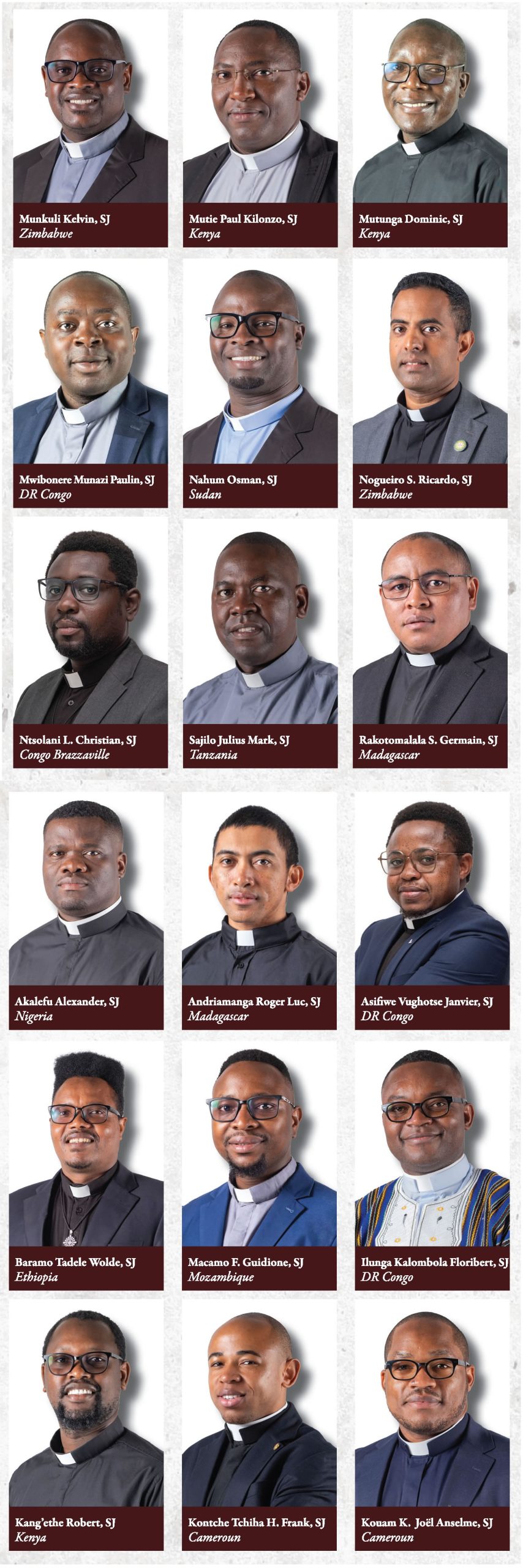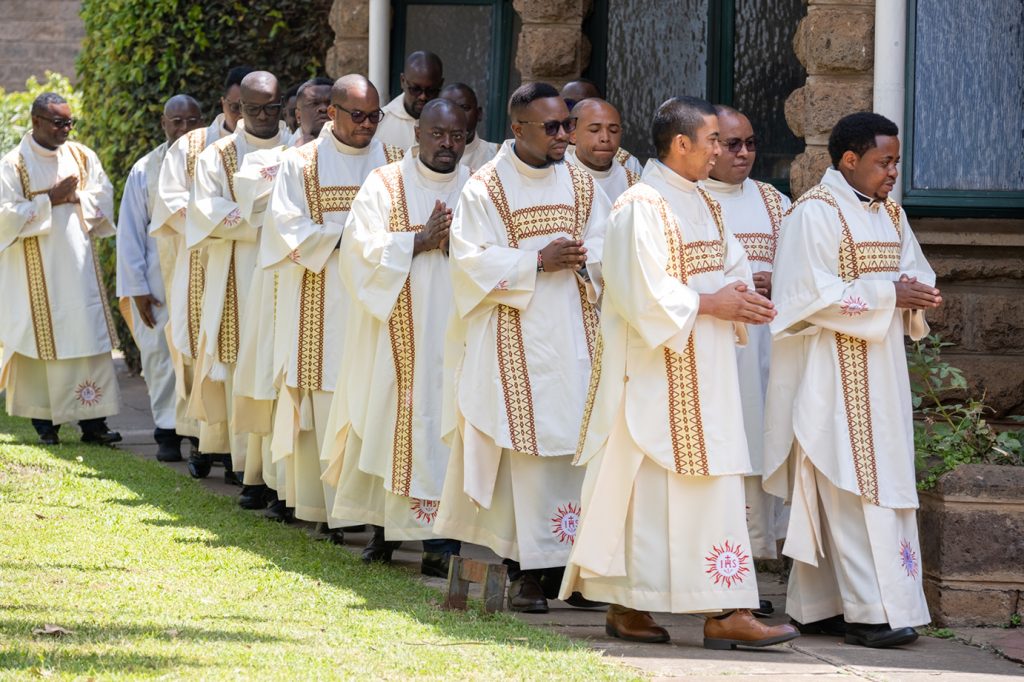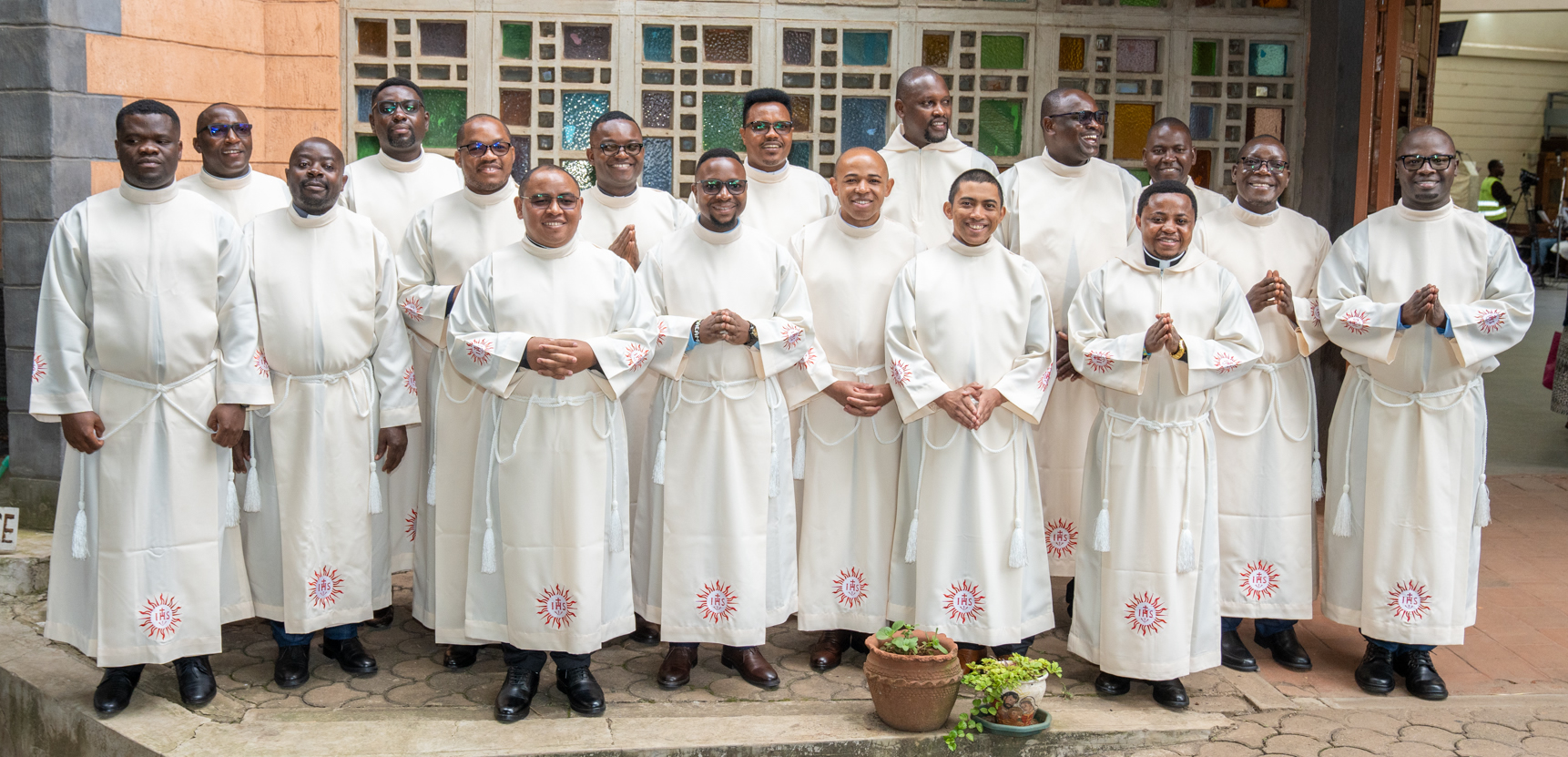
Early dawn of February 10, 2024, was the day the Lord made for fishers of Men. The morning skies beautifully overhanging above, perhaps, foreboding the optimism that lay ahead; it was the day eighteen candidates at Hekima University College were awaiting diaconate ordination. They were all eager to respond to the divine summons, the clerical call.
I made my way to the Parish where the ordination Mass was being celebrated. The Jesuit community was well aware of this event, as a huge number of them were already up and moving towards the venue. `All roads were leading to Our Lady of Guadalupe Parish, Adams Arcade. I overheard some passers-by wishing each other siku njema, which simply means ‘good day’, as they marched in separate directions. It is widely held that if you start your day on a positive note, so will it end. To the average city dweller, this was just another ordinary day with busy people moving around trying to make ends meet, but for the religious particularly the Jesuits; a reason to celebrate.
The eighteen Jesuit candidates enlisted to receive a holy ritual of ordinance in the Ministry of Deacons represent a variety of African regions including Southern Africa, Eastern Africa, West Africa, and North Africa. This diversity is important to the Society of Jesus, as a depiction of its universal contribution to enriching knowledge and experience among diverse cultures.
The mass was split into two parts, as is customary: The Litany of Saints and the Deacons receiving the Book of the Gospels. Receiving the book of the Gospels implies duty, as specified by the appointment of a Deacon. The mass was split into two parts, as is customary: The Litany of Saints and the Deacons receiving the Book of the Gospels. Receiving the book of the Gospels implies duty, as specified by the appointment of a Deacon. The Litany of Saints is central to the Catholic Church’s practice of invoking holy saints to pray with and for petitioners. Candidates are also subjected to the ‘prostration ritual,’ which compels them to lie prostrate on the ground as part of a religious ceremony, particularly before ordination. The ritual symbolizes humility, submission to God, and the giving up of one’s life in service of the divine vocation. It is a solemn and significant gesture that is frequently accompanied by prayers and blessings at religious ordination ceremonies, such as the ordination of priests of different religious backgrounds.
The Ordaining Prelate was Bishop Rodrigo Mejía Saldarriaga, SJ, Vicar Apostolic Emeritus of Soddo, Ethiopia. He was flagged by Major Superiors from all Jesuit Provinces, Formators, Formation Delegates, friends, and families of the celebrants from all across the world gathered to witness their people make these vows. When Bishop Mejía started with the citation, “This is the day which the LORD has made; let us rejoice and be glad in it.” He described a Deacon as a servant of the Church, of liturgy, and the life of people, who ought to be ready to offer spiritual service when the need arises. It is the penultimate step into the Sacrament of priesthood. Upon ordination, Deacons can read and preach the gospel, bless marriages and sacramental, distribute holy communion, administer communion to the sick, and perform a variety of other prescribed liturgical functions.
The Catholic Church recognizes two types of Deacons. The first class consists of married Deacons, who are ordained for the church’s purpose and serve for life. The second class is known as transitional diaconate which leads toward priesthood. Deacons and priests are consecrated to the service of God’s people, no matter how far you advance in the priestly hierarchy. The same attitude of service is maintained. According to Bishop Mejía, being a Deacon is more than just a symbolic ornament; it is a participation in the Church’s mission of spreading the gospel across the world and community. He reminded the Deacons that most communities are plagued by a variety of vices. As a result, it requires Deacons who will not merely attend church but take an active role in evangelization.
“In a society that is torn apart by wars, by violence, corruption, by so many threats that we know. To be a (people) servant and a community builder is a great challenge. Starting of course by our own local communities in which we live because if our communities themselves are not united, we will never be able to unite communities outside.” —Bishop Rodrigo Mejía Saldarriaga, SJ
Frs. Jean Luc Enyegue and Emmanuel Banda, SJs, were instrumental in the planning of this liturgical service. In an interview with Capuchin TV, Fr. Banda explained that the Jesuit formation process is somewhat lengthy because the novitiate beginning stage of formation, lasts for two years. After that, one would go on to study Philosophy, which takes one year, followed by two years of Regency, which could be administrative or pastoral, and then they would go on to study Theology, which takes another three years or so depending on the situation, and after those three years, they would be qualified fishers of men. Guided by the Jesuit Charism, the new Deacons are expected to see God in All Things and encouraged to remain steadfast in their vocation, academically, spiritually, and even physically.

Diaconate Candidates make a procession to the Chapel for Thanksgiving
Speaking to Capuchin TV on behalf of the Deacon candidates, Nogueiro S. Ricardo, SJ of Zimbabwe admitted to being naturally nervous despite all the years of the formation. He was grateful to everyone who contributed their time, skills, and resources to their formation as Deacons. Ricardo said that he found it easy to join the Jesuits because he grew up in a Jesuit parish. He admitted that he never considered joining the Jesuits until later in life when God directed him to that path. Before joining the Jesuits, Ricardo worked as a Finance Officer for a Non-Governmental Organization (NGO) in America while studying. He stated that Jesuits place a high emphasis on spiritual exercises, to help grow spiritually, be at peace with oneself, and find God in everything and everywhere.
He is convinced that following his ordination, he would be able to assist communities in various ways, including preaching, listening, maintaining confidentiality, and guiding people to find God in their lives among many other things.
In a vote of thanks, Macamo F. Guidione, SJ of Mozambique, on behalf of his companions, the other 17 newly ordained Deacons, thanked God for the vocation, to which they freely responded with genuine delight. He stated that they were ready to begin on a road of service and ministry, guided by prayer, thought, and faith. Quoting from the gospel of Luke 22:27, he reported that the Deacons were ready to serve with humility and enthusiasm, compassion, and steadfast commitment to the values that define the Jesuit traditions and celebrate God’s work in their life and the teachings of the founding Father of the Jesuits, St. Ignatius of Loyola.
“The journey that led up to this point of ordination was one of self-discovery, deep spiritual growth and a profound realization to the call of service.”
The Deacon expressed gratitude to everyone who helped them along the way in their formation, notably His Lordship Bishop Mejía, who presided over the Eucharistic celebration and ordination and gave the new Deacons wise counsel during their formation.
Young men interested in joining the Society of Jesus—The Jesuits, should contact their respective region’s Vocations Directors to learn more about the Society’s requirements. Fr. Banda, on the other hand, was quick to point out that being a Jesuit necessitates a soul-searching moment to determine whether or not one is truly called to the vocation. This sentiment is also echoed in a book titled: Challenge to Religious Life Today.
“This synthesis of priesthood and secular profession, is no easy task and not for everyone, and must be accomplished deep in the Jesuit’s heart as well as in the head.” — 1979, Pedro Arrupe, S.J
The society today will look up to newly ordained Deacons, who are expected to be evangelists in the deaconry service, which is structured on three simple statements: communal, participation, and mission. Their spiritual lives should be devoted to the betterment of the entire Church. They should implore their varied charisms across the Church to make religious vocation a positive experience.
Geoffrey Obatsa
Administrative Assistant, JHIA




